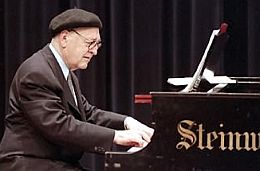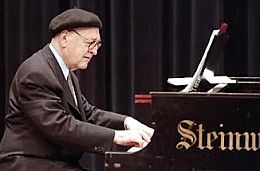
It happens very rarely, even if it's the essential goal of every performance in any genre, but especially in opera: For everything to click, everybody performing at their personal best, and it all comes together.
At the final performance of the Pocket Opera's season, in the Legion of Honor on Sunday, when Donald Pippin and the Pocket Philharmonic launched into the overture (the best-known part) of Otto Nicolai's 1849 The Merry Wives of Windsor, I sat up and paid attention.
There was something right about this swift, bubbly music, with strong undertones of Mendelssohn, Johann Strauss (and later an outright borrowing from Humperdinck's Hansel and Gretel).

Photo by Cliff Romig
At 88, Pippin plays the piano with the combination of decades of experience and a conservatory student's enthusiasm and élan. The first and second violin "sections," namely Yasushi Ogura and Hande Erdem, along with two more strings, and four woodwinds (and that's the whole orchestra) produced a shimmering, just-right sound; keeping it all together, dedication making up for the meager numbers. They were in the zone.
Even more so, if that's possible, was Marcelle Dronkers as Mistress Ford, the first to sing, the first to give me a rock-concert experience, the big, bright, soaring voice in the small theater pushing me against the backrest of the seat. And crystal-clear diction. And becoming the role. Goodness!
When I say everything was in the zone, that's exactly what I mean. Each entrance impressed, amazed. Meghan Dibble's Mistress Page was fresh and charming, her interaction in the conspiracy against Falstaff with Dronkers' Alice Ford both wicked and winning.
When the title character arrived — Gregory Stapp, as a giant, enormous figure, with voice to match — it was no longer a tiny stage in a small (albeit beautiful) hall, but somewhere out there at the apex of grand opera at its grandest.

Photo by Stephen V. Stapp
Up came the very young and appealingly talented Molly Wilson's Anne Page; her suitor, Fenton, sung gorgeously by Jonathan Smucker (strange how Fenton's aria is a highlight of both this opera and Verdi's Falstaff, the two sharing music of the epitome of youthful romantic abandonment from a middle-aged and old composer, respectively); Jonathan Spencer's fussy (in action) and clear (in voice) Ford; Abram Poliakoff's Slender, Wayne Wong's slightly overdone Dr. Caius, and Sergey Khalikulov's Page.
The "chorus" consisted of one soprano (Maria Janus), one second soprano (Elenka Proulx), one tenor (Brian Chu), and one baritone (Jeremiah Lee) — and yet in the climactic closing scene, as Falstaff is tortured by fairies in Windsor Forest, the seven-voice ensemble sounded like the Mormon Tabernacle on a good day.
Pippin's narration was, as ever, droll, informative, thought-provoking. A minor aside about the original meaning of "merry" later sent me to research, and even after so many years of knowing the opera, I just realized that when Shakespeare wrote the play, in 1602, it had more, and less presentable meaning than pleasing or agreeable. As Pippin mentioned, there were some hormonal aspects to the merry behavior.

As usual, Pippin's version (not translation) of the text was simply merry in the contemporary sense.
Between Shakespeare and the retranslation of Salomon Hermann Mosenthal's German libretto, Pippin got the best of both, and then spiced it up with his own Pippinisms, including contemplation of "getting lucky" in the carnal, but non-Shakespearean, sense.
I have such high esteem for Pippin's librettos that I automatically credited him for one of the funniest bits in the text, when Slender and Cajus are hiding from Fenton and each other behind separate bushes, and Cajus says "Zen I address her de man propre bouche," and Slender panics: "He's found the bush!" But alas, it's from the Mosenthal libretto, although I cannot find it in Shakespeare.
Just as Pippin multitasks amazingly — artistic director, finder of great young voices, nurturing singers, producing unique English texts, narrating, playing the piano, and conducting — the company's production manager, Nicolas Aliaga, deserves multiple kudos.

He was stage director for this production, moving the complex action on a that scrap of a stage, he holds the company together, and at the Sunday matinée, he handled a scary, dramatic situation smoothly and well.
A young woman in the cast had an epileptic seizure on-stage, at first not noticed by the cast, and believed to be part of the staging by most of the audience. When eventually, she collapsed, Aliaga stopped the performance, had 911 notified, called for a doctor in the house (five rushed to the stage, insurance company instructions be damned, good for them).
And after the performance resumed — with the same in-the-zone intensity — and there was a brief intermission, Aliaga led the woman out to the stage to assure the audience that she is OK. There was relieved applause.
At the end of the performance, there was long, celebratory applause, acknowledging an amazingly great performance from a small company. Long may they reign.

